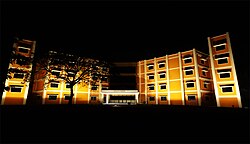This article needs additional citations for verification .(February 2018) |
 The new faculty block of Kilpauk Medical College | |
| Motto | Mens Sana Incorpore Sano ("A sound mind in a sound body") |
|---|---|
| Type | Medical college |
| Established | 1960 |
| Dean | Dr. M. Kavitha |
| Location | , India |
| Affiliations | Tamil Nadu Dr. M.G.R. Medical University |
| Website | http://kilpaukmedicalcollege.in/ |
 | |
 | |
Government Kilpauk Medical College (GKMC) is a government medical institution in Chennai, India. Founded in 1960, there are four hospitals attached to GKMC - Government Kilpauk Medical College Hospital. They are Government Royapettah Hospital, Government Thiruvotteeswarar Hospital of Thoracic Medicine, Government Peripheral Hospital, K.K.Nagar and Government Peripheral Hospital, Anna Nagar. The college is affiliated to The Tamil Nadu Dr. M.G.R. Medical University, Chennai. It offers a number of undergraduate and postgraduate programs.
Contents
- Classes and years of entry
- Affiliation
- Undergraduate programs
- Postgraduate programs
- About the New Hospital
- Notable alumni
- References
- Official College Link
The hospital is the third in the government sector, after the Rajiv Gandhi Government General Hospital and the Government Royapettah Hospital, to have a full-fledged emergency department, which includes triage area, resuscitation bay and colour-coded zones, per the Tamil Nadu Accident and Emergency Care Initiative (TAEI) guidelines. [1] The hospital is recognised as a level II trauma care centre. The zero-delay ward of the hospital receives an average of 40 to 50 cases every day. [1]